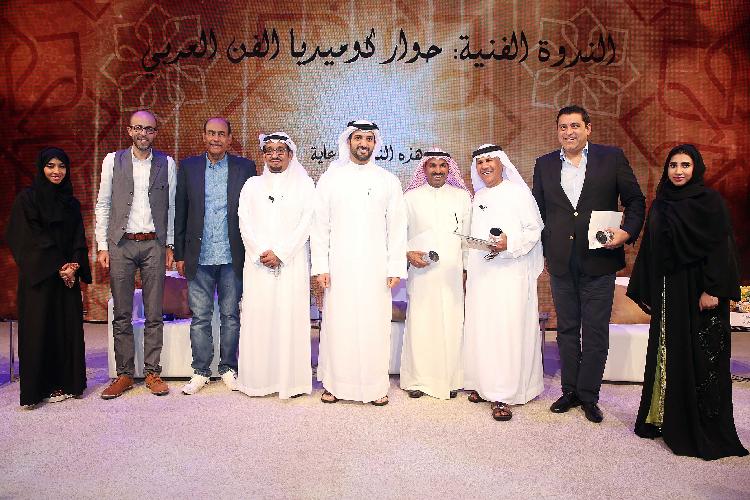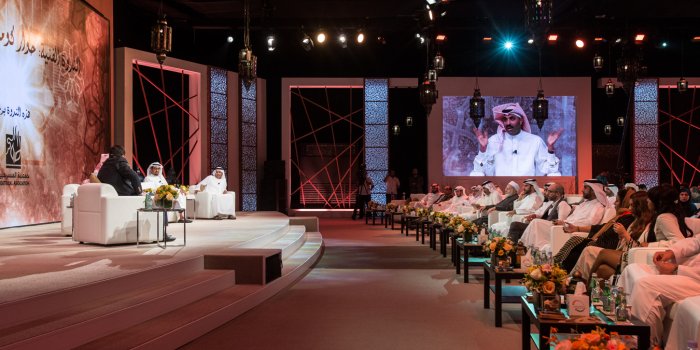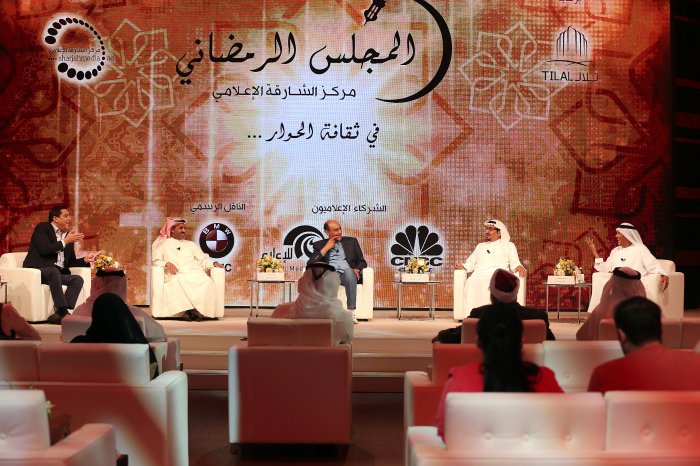
Famous Arab comedians bring joy to SMC’s Ramadan Majlis
“It is impossible to separate art from politics. Comedy cannot be separated from facts,” say comedians Ahmed Bedair and Tareq Al Ali
Popular Arab comedians created an atmosphere of fun and laughter at the fourth Ramadan Majlis, organised by Sharjah Media Centre (SMC), yesterday (Wednesday) at Al Majaz Amphitheatre. The third session titled Arab Comedy Dialogue, saw a large public turnout with four accomplished comedians, armed with a natural sense of humour who highlighted the status of the entertainment industry in the region and spoke about the trajectory of their respective careers.
Egyptian artist Ahmed Bedair, Kuwaiti artist Tareq Al Ali, Saudi artist Abdullah Al Sadhan and Emirati comedian Jaber Nagmoush took part in the session, which was moderated by Egyptian TV presenter and host, Moataz Al Demerdash. The session was sponsored by the Theatrical Association of Sharjah, and was attended by His Excellency (HE) Sheikh Sultan bin Ahmed Al Qasimi, Chairman of Sharjah Media Centre; Dr Rashad Mohammed Salim, Director of Al Qasimia University; and Osama Samra, Director of SMC; in addition to a number of intellectuals, artists and media figures.
HE Sheikh Sultan bin Ahmed Al Qasimi welcomed the artists who participated in the Ramadan Majlis saying: “Sharjah has always been home to intellectuals and artists in all fields of creativity, in line with the vision of His Highness Sheikh Dr Sultan bin Muhammad Al Qasimi, UAE Supreme Council Member and Ruler of Sharjah, who supports talented and creative people of all nationalities, and gives them an opportunity to contribute to Sharjah's cultural environment.”
Comedian Ahmed Bedair pointed out that is it harder to make someone laugh than it is to make them cry. “The artist serves as a mirror to people as he highlights their concerns and problems. It is impossible to separate art from politics, which is a key topic in all walks of life,” he said.
Bedair talked about his role in the play, Raya and Sakina, saying: “When an artist works with a more famous and popular artist, he can benefit greatly. So the play, which was shown for the first time in 1984, constituted a quantum leap in my career. There is no prior training on how to make people laugh, but I found the best comedy is spontaneous as this makes the greatest impact on audiences.”
Saudi artist Abdullah Al Sadhan highlighted the importance of the script, saying only the artist's talent and performance that can make the audience laugh. The comic actor must add something of his soul, humour and personality, he suggested. Al Sadhan said, “For me, I do not take the script as it is but always try to take part in writing and editing. This adds to my performance on stage, and contributes to making people laugh. I believe that the most successful genres of comedy are those that start in one’s home, and are about the family. I prefer to move away from political and religious topics.”
Al Sadhan, who is known for the TV satirical comedy Tash Ma Tash, criticised social networking sites that limit real communication between family members. He shared the view that the irony of these sites in Arab comedy is a natural result of their negative effects on the social and family fabric.
Emirati comedian, Jaber Nagmoush, said: “I learnt a lot from old Egyptian and Kuwaiti plays starring pioneers of Arabic theatre, such as Zaki Tulaimat. If laughter emanates from the heart, it shows on your face and then your smile can express real happiness. But due to the circumstances experienced by some Arab countries, it is impossible for people to laugh from the heart.”
But Kuwaiti artist, Tareq Al Ali disagreed with Nagmoush about the impossibility of laughter during current events, noting that what makes us laugh today lies in what comic works present us with - reflecting our ordeal. He noted: “Comedy is a great and brave art because it makes people laugh at their woes and concerns. Comic art cannot be separated from facts, whether bad or good.”
Al Ali said that art is not born out of a vacuum, but deals with what goes on in society, especially life in all its details. He went on to praise His Highness Sheikh Dr Sultan bin Muhammad Al Qasimi, UAE Supreme Council Member and Ruler of Sharjah, in supporting theatrical movement and work, describing His Highness as "the Spiritual father of Arab artists", and Sharjah as home to distinguished cultural and artistic events.
On this occasion, Sharjah Media Centre launched a competition to take selfie pictures with the artists who participated in the evening and then post them on Instagram, along with the contest's hashtag, #Culture-of-Dialogue, and dozens took part hoping to win. The Sharjah Department of Statistics and Community Development encouraged attendees to take photos with family members and friends using the logo of the Sharjah Census 2015, and then post them to social networking sites. The Census, which is scheduled to begin in October this year, will provide the necessary digital data to develop the economic, social and cultural sectors in the emirate and to inform the development plans set out by the Government of Sharjah.
The next session of the Ramadan Majlis is on Monday with sports as its main point of discussion. The session is titled the Professionalism of Emirati Football Players and will host former President of Ras Al Khaimah Club, HE Sheikh Mohammed bin Saqr Al Qasimi; former president of the FIFA International Federation of Football History and Statistics (IFFHS), Eng. Marwan bin Ghalaita; and the Chairman of Al Nasr Football Club and star player of Al Jazira Club, Ali Khasif.



























